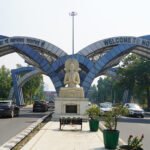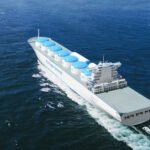When Constantin Robertz was employed by Zalora, he helped move facilities six times as the e-commerce company’s logistical infrastructure developed beyond its capacity. This gave him the idea to co-found Locad, an omnichannel e-commerce logistics company that links its network of outside warehouses and shipping businesses with a cloud-based platform known as its ‘logistics engine.’
Robertz, Jannis Dargel, a fellow Zalora alumnus, and Shrey Jain, a former Grab lead product manager for mapping, founded Locad in Singapore and Manila. Reefknot Investments, a partnership between Temasek and logistics firm Kuehne + Nagel, led the $11 million Series A funding round for Locad. Along with new backers Access Ventures, WTI, and JG Summit, returning investors Sequoia India and Southeast Asia’s Surge, Febe Ventures, and Antler also took part.

Robertz, Jannis Dargel, a fellow Zalora alumnus, and Shrey Jain, a former Grab lead product manager for mapping, founded Locad in Singapore and Manila.
Almost every step of the delivery process, including inventory storage, packing, shipping, and tracking, can be handled by Locad. For 200 brands thus far, including Havaians, Levi’s, Reckitt Benckiser, and Emma Sleep, Locad has handled order fulfilment. It regularly ships between 25 and 5,000 orders per day to customers in Singapore, the Philippines, Thailand, Hong Kong, and Australia. More than two million orders were shipped using Locad last year, and it boasts a 99% success record in completing transactions on the same day.
With the aim of creating the largest network of warehouses in the region over the following five years, Locad will utilize its new capital to expand its network of warehouses and transport operators as well as to hire in Southeast Asia and Australia.
It laid the idea of how a cloud approach to the supply chain, with a scalable logistics infrastructure as a service, would be a better method, according to Robertz, who helped Zalora build out its logistics infrastructure. Robertz and Dargel also worked with brands at Zalora that needed to build their e-commerce fulfilment systems and tech stacks to serve a variety of sales channels.
The traditional logistical infrastructure, designed for B2B wholesale distribution, was unable to keep up with the growth of direct-to-consumer firms’ sales channels. Additionally, it meant that when they expanded, they would no longer be able to rely on ‘walled garden’ fulfilment networks maintained by e-commerce companies like Fulfillment by Amazon (FBA).

The traditional logistical infrastructure, designed for B2B wholesale distribution, was unable to keep up with the growth of direct-to-consumer firms’ sales channels.
Conversion rates at the checkout depend on whether customers may choose from a variety of delivery alternatives, such as same-day, next-day, or economy. According to Robertz, businesses need to store products closer to customers to enable shorter and faster last-mile deliveries in order to deliver more swiftly without spending more money. This requires a network of warehouses as well as integration between the sales channels, warehouses, and delivery services. It is made possible by Locad’s technology.
The logistics engine of Locad manages storage and delivery through its network of warehouses and shipping carriers while syncing inventory from various sales channels, such as Shopify, Lazada, Shopee, and TikTok Shops. Many of Locad’s clients first contact the firm when they gradually discontinue their own logistical operations. Before moving goods into other warehouses based on where their consumers are situated, brands sometimes start with one warehouse to consolidate their inventory and order fulfilment across sales channels.
In order to enable same-day delivery in every city in the region, Locad wants to grow the number of warehouses in Tier 1 to Tier 3 cities throughout Southeast Asia and Australia as it expands there.



















